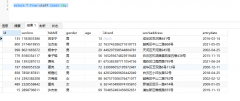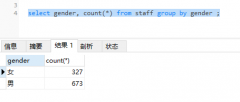Counting associated entries with Sequelize(使用 Sequelize 计算关联条目)
问题描述
我有两个表,locations 和 p>sensors.sensors 中的每个条目都有一个指向 locations 的外键.使用 Sequelize,我如何从 locations 中获取所有条目以及 sensors 中与 locations 中的每个条目相关联的条目总数?
原始 SQL:
选择`位置`.*,COUNT(`sensors`.`id`) AS`sensorCount`从`位置`加入`sensors` ON`sensors`.`location`=`locations`.`id`;GROUP BY `locations`.`id`;型号:
module.exports = function(sequelize, DataTypes) {var Location = sequelize.define("位置", {ID: {类型:DataTypes.INTEGER.UNSIGNED,主键:真},名称:DataTypes.STRING(255)}, {类方法:{关联:功能(模型){Location.hasMany(models.Sensor, {外键:位置"});}}});返回位置;};module.exports = function(sequelize, DataTypes) {var Sensor = sequelize.define("Sensor", {ID: {类型:DataTypes.INTEGER.UNSIGNED,主键:真},名称:DataTypes.STRING(255),类型: {类型:DataTypes.INTEGER.UNSIGNED,参考: {型号:传感器类型",关键:身份证"}},地点: {类型:DataTypes.INTEGER.UNSIGNED,参考: {模型:位置",关键:身份证"}}}, {类方法:{关联:功能(模型){Sensor.belongsTo(models.Location, {外键:位置"});Sensor.belongsTo(models.SensorType, {外键:类型"});}}});返回传感器;};使用 findAll() 与 include() 和 sequelize.fn()COUNT 的代码>:
Location.findAll({属性: {包括:[[Sequelize.fn("COUNT", Sequelize.col("sensors.id")), "sensorCount"]]},包括: [{型号:传感器,属性:[]}]});或者,您可能还需要添加 group:
Location.findAll({属性: {包括:[[Sequelize.fn("COUNT", Sequelize.col("sensors.id")), "sensorCount"]]},包括: [{型号:传感器,属性:[]}],组:['Location.id']})I have two tables, locations and sensors. Each entry in sensors has a foreign key pointing to locations. Using Sequelize, how do I get all entries from locations and total count of entries in sensors that are associated with each entry in locations?
Raw SQL:
SELECT
`locations`.*,
COUNT(`sensors`.`id`) AS `sensorCount`
FROM `locations`
JOIN `sensors` ON `sensors`.`location`=`locations`.`id`;
GROUP BY `locations`.`id`;
Models:
module.exports = function(sequelize, DataTypes) {
var Location = sequelize.define("Location", {
id: {
type: DataTypes.INTEGER.UNSIGNED,
primaryKey: true
},
name: DataTypes.STRING(255)
}, {
classMethods: {
associate: function(models) {
Location.hasMany(models.Sensor, {
foreignKey: "location"
});
}
}
});
return Location;
};
module.exports = function(sequelize, DataTypes) {
var Sensor = sequelize.define("Sensor", {
id: {
type: DataTypes.INTEGER.UNSIGNED,
primaryKey: true
},
name: DataTypes.STRING(255),
type: {
type: DataTypes.INTEGER.UNSIGNED,
references: {
model: "sensor_types",
key: "id"
}
},
location: {
type: DataTypes.INTEGER.UNSIGNED,
references: {
model: "locations",
key: "id"
}
}
}, {
classMethods: {
associate: function(models) {
Sensor.belongsTo(models.Location, {
foreignKey: "location"
});
Sensor.belongsTo(models.SensorType, {
foreignKey: "type"
});
}
}
});
return Sensor;
};
Use findAll() with include() and sequelize.fn() for the COUNT:
Location.findAll({
attributes: {
include: [[Sequelize.fn("COUNT", Sequelize.col("sensors.id")), "sensorCount"]]
},
include: [{
model: Sensor, attributes: []
}]
});
Or, you may need to add a group as well:
Location.findAll({
attributes: {
include: [[Sequelize.fn("COUNT", Sequelize.col("sensors.id")), "sensorCount"]]
},
include: [{
model: Sensor, attributes: []
}],
group: ['Location.id']
})
这篇关于使用 Sequelize 计算关联条目的文章就介绍到这了,希望我们推荐的答案对大家有所帮助,也希望大家多多支持编程学习网!
本文标题为:使用 Sequelize 计算关联条目


基础教程推荐
- ORA-01830:日期格式图片在转换整个输入字符串之前结束/选择日期查询的总和 2021-01-01
- 使用 VBS 和注册表来确定安装了哪个版本和 32 位 2021-01-01
- while 在触发器内循环以遍历 sql 中表的所有列 2022-01-01
- 带更新的 sqlite CTE 2022-01-01
- 如何在 CakePHP 3 中实现 INSERT ON DUPLICATE KEY UPDATE aka upsert? 2021-01-01
- 从字符串 TSQL 中获取数字 2021-01-01
- 带有WHERE子句的LAG()函数 2022-01-01
- MySQL 5.7参照时间戳生成日期列 2022-01-01
- CHECKSUM 和 CHECKSUM_AGG:算法是什么? 2021-01-01
- MySQL根据从其他列分组的值,对两列之间的值进行求和 2022-01-01

















